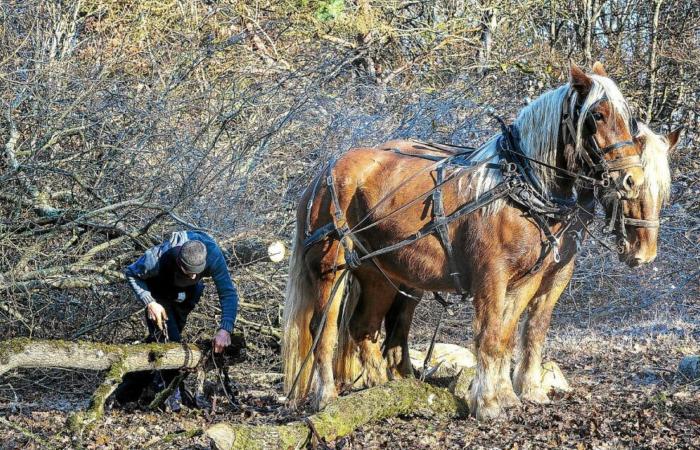A path starts from Emmanuel Gascard's house which separates two large meadows. In one of the two, three beautiful draft horses graze quietly. “They are 4 years old. I've had them for a few months, says their owner. I am starting to make them work slowly, on the farm, in the garden. These horses continue to grow and gain volume for up to 7 years. It is from this moment that they can really do logging. »
A former construction craftsman, Emmanuel Gascard left everything – his job, and Yonne, where he lived – to settle in a hamlet in Nièvre, around twenty kilometers from Nevers, ten years ago. He took over a breeding of working horses and has since trained people who would like to use these techniques. It thus responds, on demand, to logging sites which favor horses rather than machines.
No more impact than a mushroom picker
“Logging is only a small part of my business. I am asked more for agricultural work, in the vineyards for example. » Draft horses are only used, according to him, on 0.2% of logging sites in France. “This technique is used occasionally, particularly when technical or ecological constraints do not allow access to motorized vehicles. But this is not anecdotal,” comments Nicolas Blanchard, forestry and timber sector project manager at the Morvan regional natural park, in Burgundy.
In Nièvre, a department where a third of the surface is covered with forests, experiments have been carried out in recent years. In June 2022, on a 14-hectare plot located in a regional nature reserve in Prémery, mature red oaks were felled and the logging was carried out with horses so as not to deteriorate the soil full of wet areas and marellas. “The Caisse des Dépôts, which operates plots of land, regularly calls on me and my horses,” confirms Emmanuel Gascard.
We must not oppose working with horses to machines that would destroy everything. In the vast majority of cases, companies with machines do things well.
In the Morvan, the Chat sauvage forestry group has been acquiring plots for ten years with the aim of gentle and sustainable management. “We carried out our first wood cutting project last year and we chose to work with horses,” explains Frédéric Beaucher, one of the three co-managers of this forestry group. “To be honest, I was skeptical, I feared a somewhat folkloric dimension. But once the experience has passed, I no longer have the same vision of things. The result was of such good quality… It is a method that is very respectful of the soil and other trees. The weather conditions weren't very good, but the horses didn't make more of an impact than a mushroom picker. »
This winter, Le Chat sauvage should repeat the experience. “We can clearly see that this technique has advantages,” continues Nicolas Blanchard. But it requires work in good relationship with the loggers. You need horses who are accustomed to it, who are not afraid of the noise of chainsaws, for example. »
Higher cost with horses
Learning takes place upstream, as Emmanuel Gascard explains. “Working horses are calm, patient. I have to because I can't hold them back when I tie the log. They weigh up to 850 kg and are capable of towing their weight by sliding the load along the ground. When using a trinqueballe (machine equipped with two wheels pulled by horses to which the tree trunk is fixed), they can move up to twice their weight. »
An alternative to the more usual motorized skidding? “We must not oppose work with horses which would be more virtuous to machines which would destroy everything. In the vast majority of cases, companies with machines do things well, says Jérôme Mollard, director of the West Burgundy agency of the National Forestry Office (ONF). The two techniques can be complementary. Horses can transport logs to areas of the forest more accessible to machines which will then take over. »
And above all, with horses, the cost is higher for a lower return. “Even if we have never really assessed the cost represented by soil compaction linked to logging,” observes Emmanuel Gascard. In Burgundy-Franche-Comté, horse logging is financially supported: the region covers the additional cost compared to a traditional site.
France






